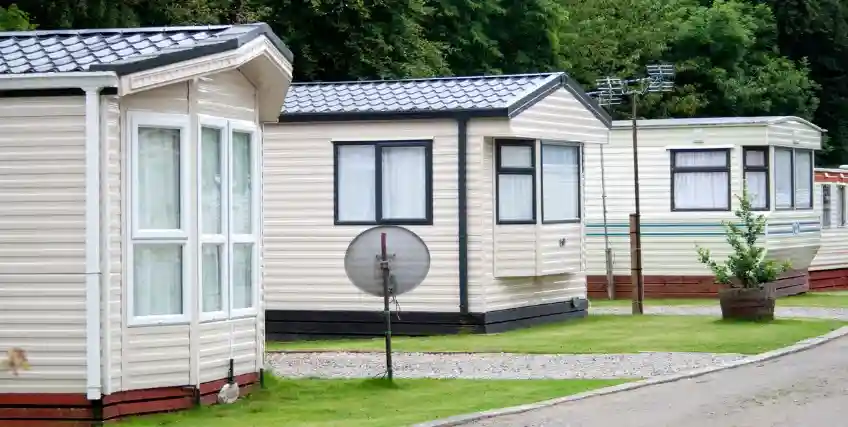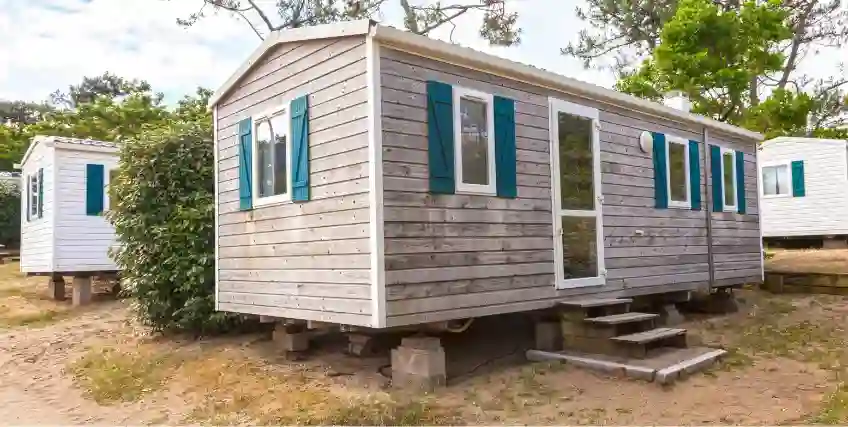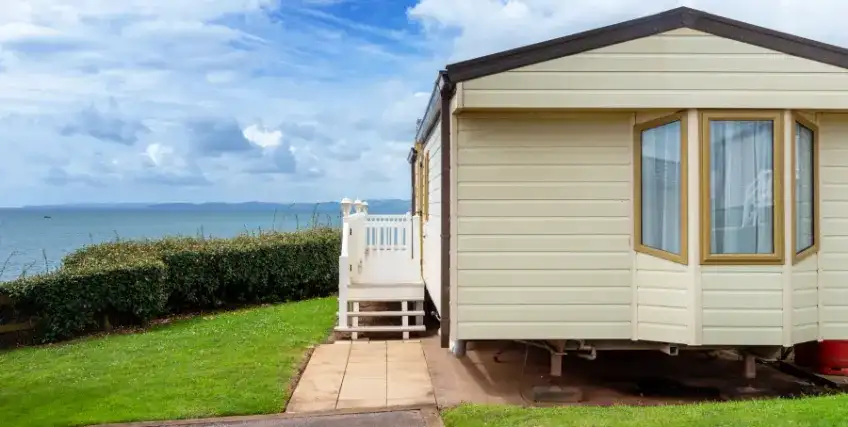Your Gateway to
Smarter Mobile Home Park Financing
Looking for Business Financing?
Apply now for flexible business financing. Biz2Credit offers term loans, revenue-based financing, lines of credit, and commercial real estate loans to qualified businesses.
Set up a Biz2Credit account and apply for business financing
Mobile home park financing plays a critical role in the growth and sustainability of manufactured housing communities across the US. These parks provide one of the most accessible forms of affordable housing, catering to millions of home buyers, retirees, and first-time homeowners seeking cost-effective living options.
Owning or expanding a mobile home park requires significant capital. Whether it’s upgrading infrastructure, adding amenities, or acquiring new land, most borrowers rely on structured financing options to make these projects possible. The right type of financing can mean the difference between a park that thrives and one that struggles to keep occupancy high.
The market for mobile home park loans has grown in recent years as investors recognize the stable cash flow these properties can generate. According to the U.S. Census Bureau, manufactured homes accounted for around 9% of all new single-family home starts in 2023, highlighting ongoing demand.
Financing isn’t one-size-fits-all. Some mobile home park lenders specialize in non-recourse loans, others in commercial mortgage programs like Fannie Mae or Freddie Mac for manufactured housing communities. Loan structures can range from fixed rate terms to interest only periods, and factors like loan-to-value (LTV), credit score, and down payment requirements all come into play.
For park owners, understanding the various loan programs, loan options, and competitive rates available can open the door to expansion, refinancing, or even cash out opportunities to reinvest in the community.
Understanding Mobile Home Parks in the US
A mobile home park is more than just a plot of land with manufactured homes. It’s a planned manufactured housing community where residents lease the land while owning their homes, often including double wide and single-wide units. These parks can range from small, family-run spaces to large-scale multifamily style communities with hundreds of units and shared amenities.
In the US, mobile home parks have a unique place in the real estate market. They provide stable housing for a segment of the population that values affordability, flexibility, and community living. As the cost of traditional single-family homes rises, the demand for affordable housing options like manufactured homes continues to grow. The U.S. Department of Housing and Urban Development (HUD) sets construction and safety standards for manufactured homes, which supports the sector’s long-term viability.
Ownership models vary. Some parks are entirely park owned homes, while others have residents who own their units but lease the lots. Investors and borrowers looking into mobile home park loans often target well-located parks with high occupancy rates and steady cash flow. These attributes can influence the loan amount, loan-to-value (LTV) ratios, and interest rates offered by mobile home park lenders.
The sector also appeals to investors for its resilience during economic shifts. Even during downturns, manufactured housing communities tend to maintain steady demand, given their affordability compared to other commercial real estate assets. This makes mobile home park financing a strategic tool for acquisition, refinancing, or expansion.
With loan programs ranging from Fannie Mae and Freddie Mac backed products to seller financing and creative financing structures, understanding the market landscape is key for any park owner considering a loan application.
Why Financing is Crucial for Park Owners
For many owners, mobile home park financing isn’t optional – it’s essential. The capital requirements to acquire, upgrade, or maintain a manufactured housing community can be significant. Without access to the right loan programs and financing options, growth opportunities may be lost.
1. Acquisition and Expansion
Buying an existing mobile home park or adding more lots to your property demands substantial funding. Mobile home park loans can cover a large portion of the purchase price, with loan-to-value (LTV) ratios varying based on occupancy, market trends, and borrower creditworthiness. Expansion often means infrastructure development, which can involve commercial mortgage financing or Fannie Mae/Freddie Mac backed loan options. These moves can help increase cash flow and long-term park value.
2. Infrastructure and Compliance Upgrades
From road paving to utility modernization, infrastructure costs can be steep. Many states enforce strict rules for manufactured home communities. To meet these HUD standards, owners often use mobile home park lenders who offer competitive rates and flexible year term structures. This financing can support upgrades without draining operational reserves, keeping homeowners satisfied while meeting regulations.
3. Refinancing and Cash Flow Management
Refinancing a mobile home park loan can lower interest rates, extend amortization, or provide cash out for reinvestment. A refinance can also shift from a fixed rate to an interest only period, improving short-term liquidity. For parks with consistent occupancy and healthy revenue, this can free up funds for marketing, repairs, or debt consolidation. Some owners also explore creative financing and seller financing to better align repayment with seasonal cash flow patterns.
Types of Mobile Home Park Financing Options
There’s no single formula for mobile home park financing. Different owners have different goals, and the right type of financing depends on the property, loan amount, and long-term plans. Here are some of the most common paths.
1. Traditional Bank Loans
Local and regional banks remain a common choice for mobile home park loans. These often require a strong credit score, a healthy loan-to-value (LTV) ratio, and consistent occupancy history. While banks can offer competitive rates, approval can be slow, and terms are typically less flexible. For established parks with steady cash flow and solid financial records, this route can secure fixed rate or interest only periods, depending on underwriting.
2. Government-Backed Loan Programs
Programs like Fannie Mae, Freddie Mac, and HUD loans cater specifically to manufactured housing communities. These offer longer year term lengths, higher allowable LTVs, and sometimes non-recourse structures, making them attractive for larger parks. Borrowers can access loan options with more favorable amortization schedules, allowing better alignment with park revenues. These are often used for both acquisitions and refinancing.
3. Private Lenders and Commercial Mortgage Options
Private mobile home park lenders and commercial mortgage providers can move faster than banks. They often cater to borrowers with unique needs or unconventional park setups, such as mixed-use properties that include RV park components. While rates can be slightly higher, these loan programs offer flexible structures, varying down payment requirements, and the possibility of creative financing solutions.
4. Seller Financing
Sometimes the best mobile home park financing comes directly from the seller. With seller financing, the seller acts as the lender, setting loan terms like interest rates and amortization directly with the buyer. This can reduce upfront costs, bypass strict bank underwriting, and help close deals faster. While not always available, this method can be particularly valuable for parks with unique ownership histories or for buyers seeking to avoid traditional loan application hurdles.
Loans for Mobile Homes in Parks
Loans for mobile homes in parks differ from broader mobile home park financing because they focus on individual units rather than the entire community. In many manufactured housing communities, residents own their home but lease the lot from the park. Financing these homes requires a different approach compared to a commercial mortgage for the whole park.
These loans often resemble personal property loans or chattel loans, since the homes are not permanently affixed to the land. According to the Consumer Financial Protection Bureau, chattel loans tend to have higher interest rates and shorter terms than traditional mortgages. That’s because they’re secured only by the home, not the underlying land.
Some lenders also offer Fannie Mae and Freddie Mac backed programs for certain manufactured home purchases, which can mean more favorable loan terms and potentially lower down payment requirements. However, eligibility often depends on whether the home meets HUD construction standards and is located in a qualifying community.
For borrowers buying double wide or newer models in established parks, there may be opportunities for competitive rates and creative financing options through local banks or mobile home park lenders. Owners of park owned homes sometimes finance the units themselves, effectively acting as the lender.
Understanding the difference between these unit-level loans and full mobile home park loans helps both home buyers and park owners match the right type of financing to their goals.
Key Factors Lenders Consider
When it comes to mobile home park financing, lenders don’t just look at the property’s purchase price. They evaluate a mix of financial, operational, and market-based factors to decide loan eligibility and terms.
1. Occupancy Rates and Cash Flow
Consistent occupancy is critical. A park with steady or growing tenant numbers signals stability, which can lead to better loan terms and competitive rates. Strong cash flow reassures mobile home park lenders that the park can comfortably handle repayment.
2. Property Location and Market Demand
Parks located near employment hubs, schools, and essential services typically attract more residents. High-demand areas may qualify for higher loan-to-value (LTV) ratios and better interest rates, making financing more accessible.
3. Borrower Financial Profile
A strong credit score, low debt levels, and proven management experience can improve approval odds. Some loan programs require detailed income statements, tax returns, and operational histories to assess risk.
4. Physical Condition and Compliance
Lenders often require inspections to verify the park meets HUD and local standards. Poor infrastructure or non-compliance can delay or derail loan applications. Upgraded utilities, maintained roads, and compliant park owned homes add to lender confidence.
5. Loan Size and Type of Financing
The desired loan amount, whether for refinancing, acquisition, or expansion, influences underwriting. Larger parks may qualify for Fannie Mae, Freddie Mac, or commercial mortgage products, while smaller ones may turn to creative financing or seller financing solutions.
A park that checks these boxes is far more likely to secure favorable mobile home park loans from qualified lenders.
Challenges in Getting Mobile Home Park Loans
Even with strong demand for manufactured housing communities, securing mobile home park financing can be more complicated than other commercial real estate loans. Certain hurdles can delay or block approval, no matter the borrower’s experience.
1. Zoning and Regulatory Hurdles
Local zoning laws can restrict the expansion or redevelopment of mobile home parks. Lenders often hesitate if future growth is uncertain due to municipal restrictions. In addition, strict HUD and state-level standards for manufactured homes can create additional compliance costs, impacting the park’s profitability and perceived value in underwriting.
2. Limited Lender Pool
Not all banks or mobile home park lenders are comfortable with this asset class. While there’s growing investor interest, the pool of lenders experienced in mobile home park loans remains smaller than for other property types. This can lead to longer searches for competitive rates or force borrowers toward creative financing or seller financing options.
3. Perception and Valuation Issues
Some lenders still view mobile home parks as higher-risk investments compared to other multifamily properties. Valuation can be tricky if the park has a large number of park owned homes or mixed-use elements like RV park spaces. Underwriting often requires detailed cash flow histories and market analysis, adding time and complexity to the loan application process.
Overcoming these challenges often requires working with lenders who understand the nuances of manufactured housing communities and can offer flexible financing options aligned with the park’s operational realities.
Pros and Cons of Mobile Home Park Financing
Like any type of financing, mobile home park loans come with advantages and drawbacks. Understanding both sides can help borrowers make informed decisions that align with their business goals.
Pros of Mobile Home Park Financing
1. Access to Capital for Growth
With the right loan programs, owners can acquire new properties, expand lot capacity, or upgrade infrastructure. Fannie Mae, Freddie Mac, and other lenders offer competitive rates and longer year term structures that make large-scale improvements feasible. This can boost occupancy and long-term cash flow, increasing the park’s market value over time.
2. Flexible Financing Options
Owners can choose from fixed rate, interest only, or amortization-based repayment structures. There’s also room for creative financing, seller financing, and refinancing to lower interest rates or adjust loan terms. These options allow better cash management during expansion or renovation phases.
3. Potential for Non-Recourse Loans
Some mobile home park lenders provide non-recourse financing, limiting personal liability. If the park fails, the lender’s claim is limited to the property itself, protecting the borrower’s other assets.
Cons of Mobile Home Park Financing
1. Higher Barriers to Entry
Not every lender offers mobile home park loans, and those that do often require strong credit scores, detailed cash flow records, and higher down payments. This can make initial financing harder to secure for first-time owners.
2. Regulatory and Compliance Costs
Upgrades to meet HUD or state standards can be costly. Lenders may require these improvements before funding, adding upfront expenses on top of the purchase price.
3. Interest Rate Sensitivity
Market fluctuations can impact mobile home park financing rates, especially for variable loan options. Even small increases in rates can affect profitability, making it important for borrowers to weigh fixed rate security against potential savings from variable terms.
Balancing these pros and cons is essential for selecting the most suitable mobile home park financing path
The Future of Mobile Home Park Financing in the US
The outlook for mobile home park financing in the US remains promising, largely driven by the persistent demand for affordable housing. As home prices climb and mortgage rates remain high, manufactured housing communities are attracting both residents and investors. This sustained interest is likely to keep mobile home park loans in strong demand.
Industry experts expect more mobile home park lenders to enter the space, offering broader loan programs and financing options. This could mean more competitive mobile home park financing rates, especially for parks with stable occupancy and proven cash flow. Institutional capital, including Fannie Mae, Freddie Mac, and commercial mortgage-backed securities (CMBS), will likely continue to play a major role in funding expansions and acquisitions.
Technology may also streamline the loan application and underwriting process, making it easier for borrowers to access funds. With tools to analyze loan-to-value (LTV) ratios, project refinancing benefits, and model different amortization schedules, park owners will have more control over their financing strategy.
However, interest rate volatility remains a key variable. Borrowers may need to weigh the security of fixed rate terms against the potential short-term savings of interest only or variable rate structures.
Overall, the future points toward greater financing accessibility, provided owners can meet compliance standards and present strong operational histories.
Trusted by Thousands of Small Business Owners in America.**
Simply because we get what you go through to build a business you believe in.
**Disclaimer: All stories are real, as told by real business owners. Customers do not receive monetary compensation for telling their stories.
From One Entrepreneur to Another: We Get You
We understand what's behind building a business you believe in.
All stories are real, as told by real business owners. Customers do not receive monetary compensation for telling their stories.



Articles on Mobile Home Park Financing
Small Mobile Home Park Loans: Financing Options for Affordable Investments
Mobile home parks are an essential part of affordable housing in the United States. They provide families with an alternative to traditional homes...
Financing a Mobile Home Park: Options, Requirements, and Benefits for Investors
With housing costs rising, the demand for affordable housing in recent years has surged, and mobile home communities are uniquely positioned to meet...
Loans for Mobile Home Parks: Financing Strategies for Investors
Mobile home parks are gaining a lot of attention in the United States as a stable and profitable investment lately. For many small...
Frequently Asked Questions on Mobile Home Park Financing
1. What is mobile home park financing?
It’s funding provided for the purchase, expansion, or improvement of a mobile home park. These loans can come from banks, private mobile home park lenders, or government-backed loan programs.
2. How do mobile home park financing rates compare to other property loans?
Mobile home park financing rates can be slightly higher than standard multifamily loans, but rates depend on occupancy, credit score, and overall market conditions.
3. Can I get loans for mobile homes in parks with lower credit?
Some loan options may allow for lower credit scores, but terms may include higher interest rates or larger down payment requirements.
4. Are there government-backed mobile home park loans?
Fannie Mae, Freddie Mac, and HUD have specific loan programs for manufactured housing communities, often offering longer amortization periods and non-recourse terms.
5. What documents do mobile home park lenders require?
Expect to provide detailed cash flow statements, tax returns, loan application forms, and proof of compliance with HUD or state regulations.
Frequent searches leading to this page
Term Loans are made by Itria Ventures LLC or Cross River Bank, Member FDIC. This is not a deposit product. California residents: Itria Ventures LLC is licensed by the Department of Financial Protection and Innovation. Loans are made or arranged pursuant to California Financing Law License # 60DBO-35839



